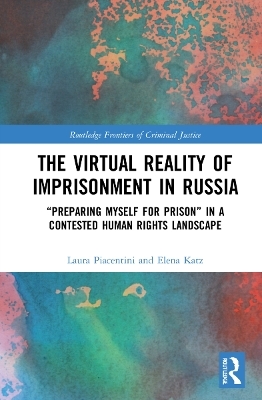
The Virtual Reality of Imprisonment in Russia
Routledge (Verlag)
978-1-032-22292-9 (ISBN)
Using the online world of Runet as the research site and presenting research from selectively drawn evidence gathered from secondary data from prison-related websites, it explores the ‘moving walls’ of the prison from socio-political and cultural perspectives. The book discusses how prisoners and their families articulate and give meaning to their experiences when they are online, and while doing so develop their rights awareness.
This book is a pioneering methodological, criminological and theoretical study, the first of its kind in global criminology and humanities, and because it is forging a new path for penal scholarship, cannot be all-encompassing but rather acts as a ‘map’ for other researchers in different fields to use. It will be useful for scholars working in comparative fields and jurisdictions on the subject of prisons, rights and how the internet is being utilised by prisoners, their families and communities organised around prison activism.
Laura Piacentini is Professor of Criminology and Fellow of the Royal Society of Edinburgh at the University of Strathclyde, Glasgow, Scotland. A trained Russian speaker, she has been researching Russian prisons since 1994. She is widely recognised, through grant capture, articles and books, as a leading international expert on Russian penal culture. Her work is multi-disciplinary and she is a passionate advocate for innovative research methods. She is a penal abolitionist. Elena Katz is a Research Consultant for the ERC Gulag Echoes project run at the University of Helsinki. Her research and teaching are in Russian Area studies and Elena has published widely in the humanities and cultural studies. Her most recent book is a collaboration with Judith Pallot: Waiting at the Prison Gate: Women, Identity and the Russian Penal System (2017). She has served as an expert witness in extradition proceedings. She is Senior Member and College Advisor at St Antony's College of the University of Oxford where she first came as a Max Hayward Fellow in Russian Literature.
Introduction: Against the past or towards the future
1. Russia, 1991: Carceral modernisation begins, prison doors shaken?
2. Methodology: Being locked up and ‘being free online’
3. Conceptualising carceralilty and human rights in prisons
4. Pain and banality of jail: ‘Death by a thousand cuts’
5. Seeking life, looking for justice: Rights consciousness of prisoners and their families
6. Prisoners’ rights in the online world in the global context
Conclusion: Crossing the boundary of illusion: What next for Russian prisons?
| Erscheinungsdatum | 19.04.2022 |
|---|---|
| Reihe/Serie | Routledge Frontiers of Criminal Justice |
| Zusatzinfo | 1 Tables, black and white; 1 Line drawings, black and white; 5 Halftones, black and white; 6 Illustrations, black and white |
| Verlagsort | London |
| Sprache | englisch |
| Maße | 156 x 234 mm |
| Gewicht | 453 g |
| Themenwelt | Recht / Steuern ► EU / Internationales Recht |
| Recht / Steuern ► Strafrecht ► Kriminologie | |
| Recht / Steuern ► Strafrecht ► Strafverfahrensrecht | |
| Sozialwissenschaften ► Soziologie ► Spezielle Soziologien | |
| ISBN-10 | 1-032-22292-1 / 1032222921 |
| ISBN-13 | 978-1-032-22292-9 / 9781032222929 |
| Zustand | Neuware |
| Informationen gemäß Produktsicherheitsverordnung (GPSR) | |
| Haben Sie eine Frage zum Produkt? |
aus dem Bereich


